Module 2 Unit 5 Magazine articles 第2课时课本讲解及句型拓展课件+嵌入音频(共31张PPT)
文档属性
| 名称 | Module 2 Unit 5 Magazine articles 第2课时课本讲解及句型拓展课件+嵌入音频(共31张PPT) |

|
|
| 格式 | pptx | ||
| 文件大小 | 7.7MB | ||
| 资源类型 | 教案 | ||
| 版本资源 | 牛津上海版(试用本) | ||
| 科目 | 英语 | ||
| 更新时间 | 2023-04-04 06:36:22 | ||
图片预览


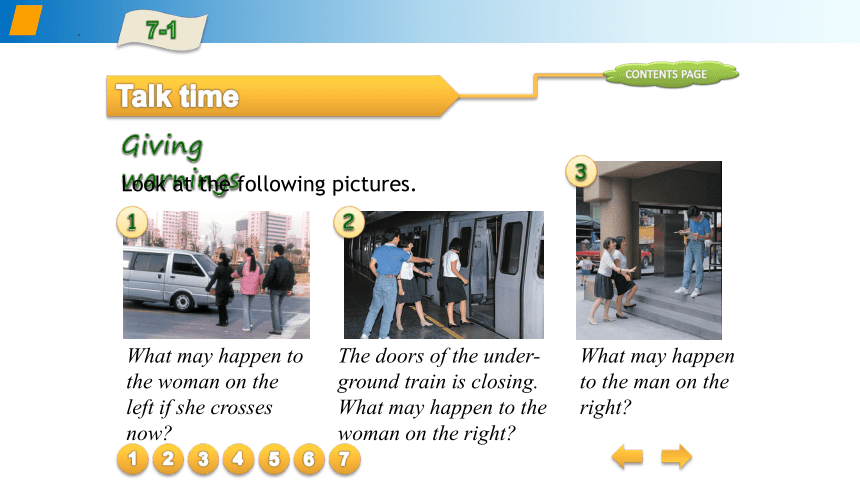
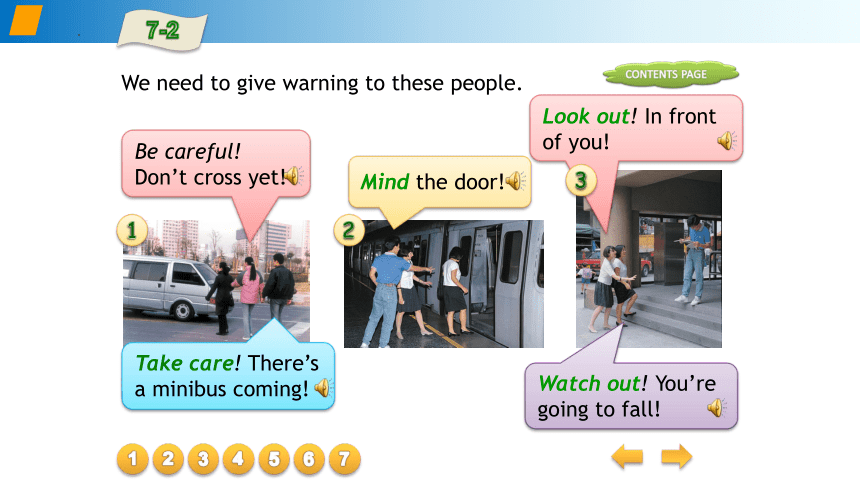
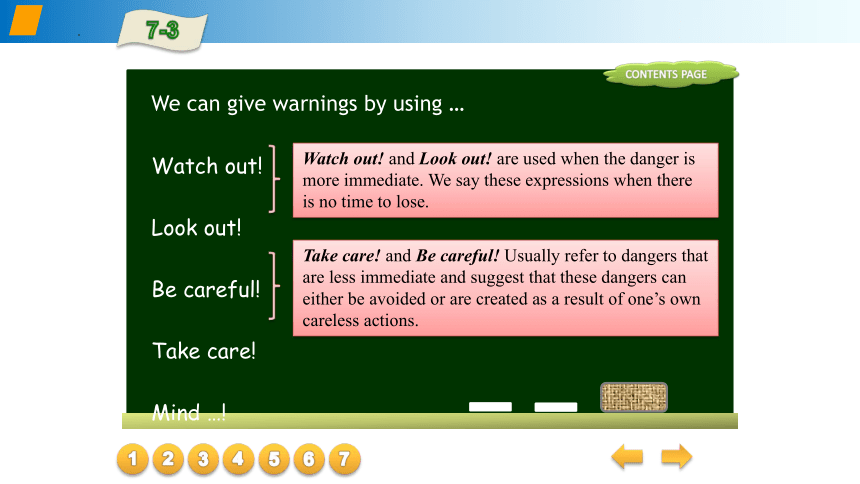
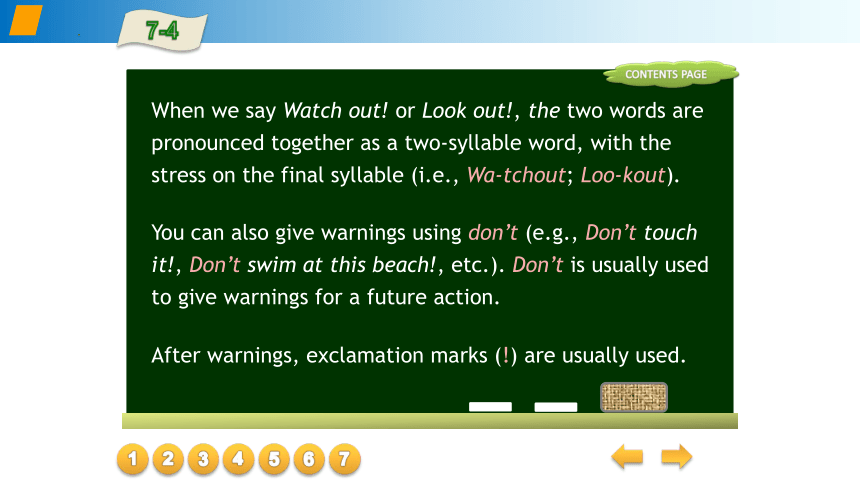
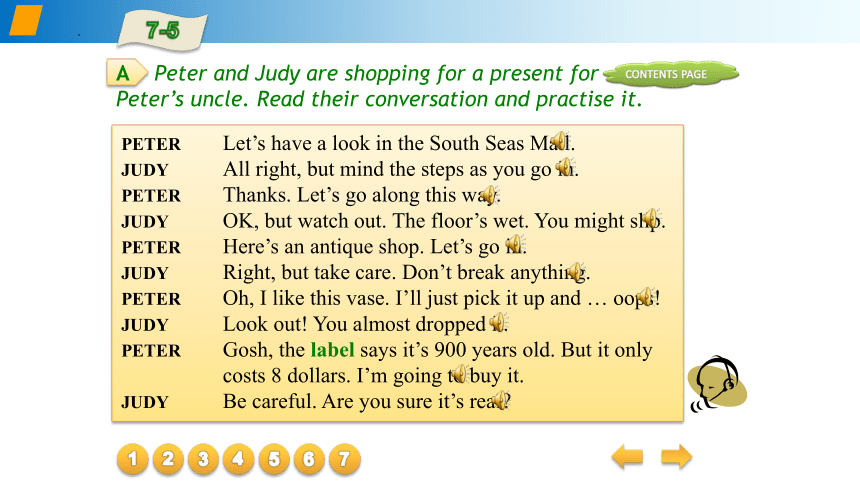
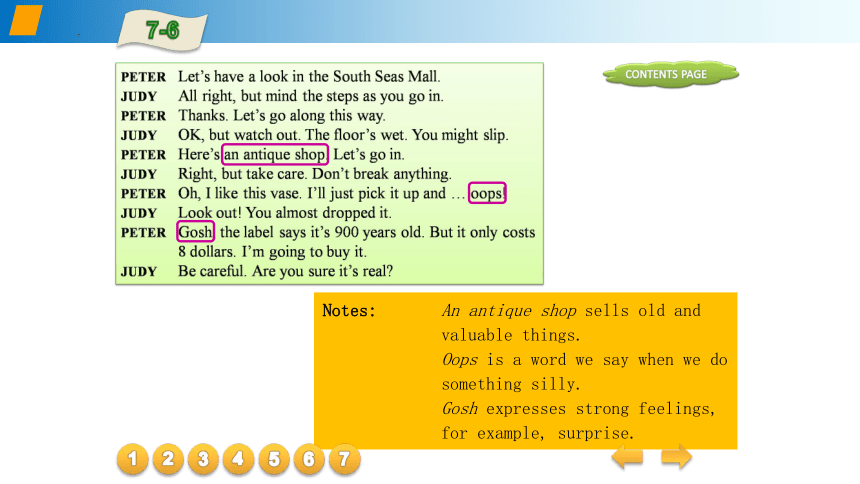
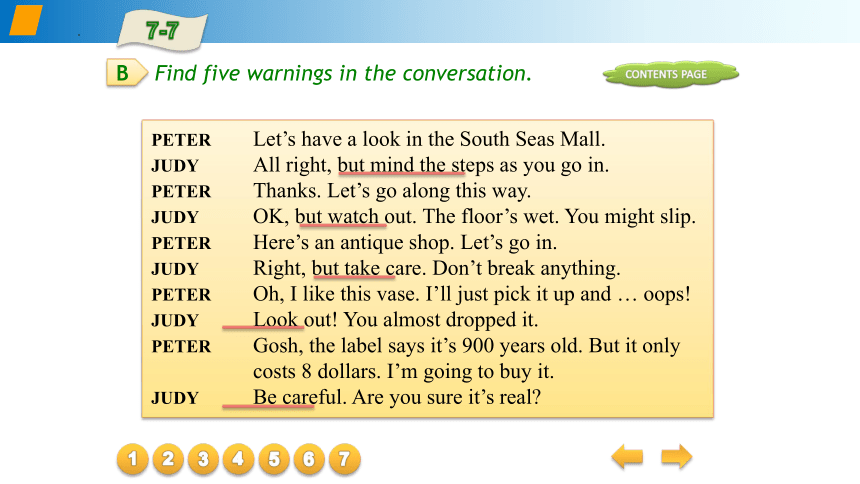
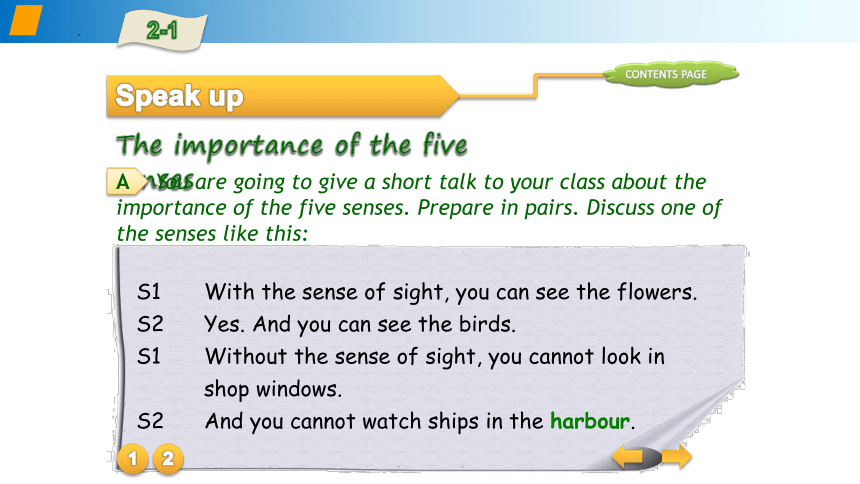
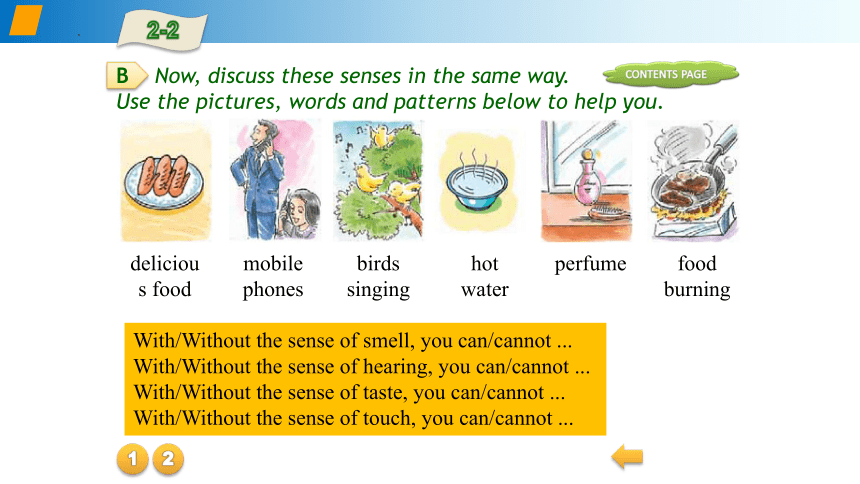
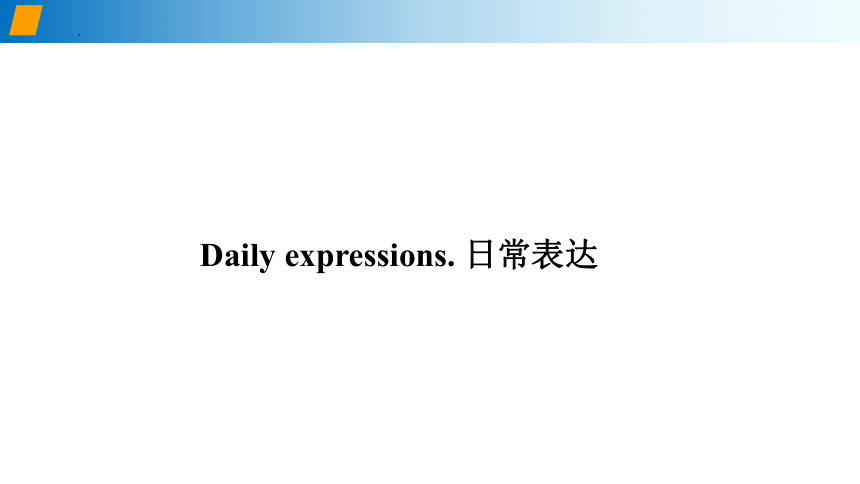
文档简介
(共31张PPT)
Magazine articles
牛津上海版 英语 八年级 第二学期
Unit 5
Episode 2
Talk time
Speak up
CONTENTS PAGE
Talk time
7-1
1
2
3
4
5
6
7
Giving warnings
Look at the following pictures.
1
2
3
What may happen to the woman on the left if she crosses now
The doors of the under-ground train is closing. What may happen to the woman on the right
What may happen to the man on the right
7-2
1
2
3
4
5
6
7
We need to give warning to these people.
1
2
Be careful! Don’t cross yet!
Take care! There’s a minibus coming!
Mind the door!
Look out! In front of you!
3
Watch out! You’re going to fall!
We can give warnings by using …
Watch out!
Look out!
Be careful!
Take care!
Mind …!
Watch out! and Look out! are used when the danger is more immediate. We say these expressions when there is no time to lose.
Take care! and Be careful! Usually refer to dangers that are less immediate and suggest that these dangers can either be avoided or are created as a result of one’s own careless actions.
7-3
1
2
3
4
5
6
7
When we say Watch out! or Look out!, the two words are pronounced together as a two-syllable word, with the stress on the final syllable (i.e., Wa-tchout; Loo-kout).
You can also give warnings using don’t (e.g., Don’t touch it!, Don’t swim at this beach!, etc.). Don’t is usually used to give warnings for a future action.
After warnings, exclamation marks (!) are usually used.
7-4
1
2
3
4
5
6
7
A Peter and Judy are shopping for a present for
Peter’s uncle. Read their conversation and practise it.
PETER Let’s have a look in the South Seas Mall.
JUDY All right, but mind the steps as you go in.
PETER Thanks. Let’s go along this way.
JUDY OK, but watch out. The floor’s wet. You might slip.
PETER Here’s an antique shop. Let’s go in.
JUDY Right, but take care. Don’t break anything.
PETER Oh, I like this vase. I’ll just pick it up and … oops!
JUDY Look out! You almost dropped it.
PETER Gosh, the label says it’s 900 years old. But it only costs 8 dollars. I’m going to buy it.
JUDY Be careful. Are you sure it’s real
7-5
1
2
3
4
5
6
7
Notes: An antique shop sells old and valuable things.
Oops is a word we say when we do something silly.
Gosh expresses strong feelings, for example, surprise.
7-6
1
2
3
4
5
6
7
7-7
1
2
3
4
5
6
7
B Find five warnings in the conversation.
PETER Let’s have a look in the South Seas Mall.
JUDY All right, but mind the steps as you go in.
PETER Thanks. Let’s go along this way.
JUDY OK, but watch out. The floor’s wet. You might slip.
PETER Here’s an antique shop. Let’s go in.
JUDY Right, but take care. Don’t break anything.
PETER Oh, I like this vase. I’ll just pick it up and … oops!
JUDY Look out! You almost dropped it.
PETER Gosh, the label says it’s 900 years old. But it only costs 8 dollars. I’m going to buy it.
JUDY Be careful. Are you sure it’s real
S1 With the sense of sight, you can see the flowers.
S2 Yes. And you can see the birds.
S1 Without the sense of sight, you cannot look in shop windows.
S2 And you cannot watch ships in the harbour.
Speak up
2-1
1
2
The importance of the five senses
A You are going to give a short talk to your class about the importance of the five senses. Prepare in pairs. Discuss one of the senses like this:
B Now, discuss these senses in the same way.
Use the pictures, words and patterns below to help you.
2-2
1
2
delicious food
mobile phones
birds singing
hot water
perfume
food burning
With/Without the sense of smell, you can/cannot ...
With/Without the sense of hearing, you can/cannot ...
With/Without the sense of taste, you can/cannot ...
With/Without the sense of touch, you can/cannot ...
Daily expressions. 日常表达
1. sound like听起来像
e.g. Don't always tell me how to do my work. You sound like my mother.
别总是告诉我该怎么干我的工作,你听起来像我妈一样。 sound v. 听起来(这是个连系动词,后接形容词) e.g. sound good souncl beautiful
【知识拓展】 类似的连系动词还有:feel 摸起来,感觉起来 taste听起来look看起来 smell闻起来
2. go off突然作响
e.g. When the fire alarm went off, everyone moved to the playground.
消防警铃突然作响,所有的人都逃到了操场上。
【知识拓展】 go off变质e.g. I didn't put the milk in the fridge so it went off.
我没有把牛奶放进冰箱,以致它变质了。go off爆炸e.g. The bomb went off when he started the car.
当他发动汽车的时候,炸弹就爆炸了。
3. in one’s own words 用某人自己的话说
e.g. Don't recite the story. Please tell the story in your own words.
不要背诵故事,请用自己的话讲故事。
【知识拓展】 in other words 换句话说;也就是说e.g. Joe doesn't like hard work-in other words, he's lazy!
乔不喜欢干重活儿一—换句话说,他很懒!keep one's word守信e.g. Claire said she would come, and she kept her word.
克莱尔说她会来,她果然很守信用。word for word 逐字逐句地e.g. Ian repeated word for word what you told him.
伊恩把你告诉他的话一字不差地重复了一遍。
4. lead…to…将…带领到…
e.g. The man led all the horses to the stable.
那人将所有的马都领进了马厩。
二、 Important Sentences structures
1. John Dancer's troubles began as soon as he walked into the Dragon's Head Hotel with his friend, Charlie.
as soon as, when等词引导的时间状语从句和if引导的条件状语从句,如果主句是一般将来时,从句用一般现在时代替一般将来时
I will call you as soon as I get there. 我一到那就会给你打电话。
【拓展】as soon as/ when/ until 引导的时间状语从句遵循“主将从现、主过从过”的原则。
He called me as soon as he got there. 他一到那就给我打了电话。
2. Before entering, John said, 'Can you tell me the location of the fire exit '
before entering简化了从句结构。原来的连接词保留而成“连接词+分词”的结构。
e.g. After talking to you, I always feel better. =After I talk to you, I always feel better. While sitting in class, Jack fell asleep. =While Jack was sitting in class, he fell asleep.
3. The manager agreed at once that John and Charlie could both be guests.
【记忆链接】★at once 立刻,马上= right away= immediately= in a minute★agree on sth. 就某事达成一致agree with sb. 赞同某人agree to do sth. 赞同做某事
4. You’re very sensible.【记忆链接】sensible adj.明智的 = smart/ clever/ brightsensitive adj.敏感的
5. Just then, the fire alarm went off.【记忆链接】go off (火、光)熄灭 = go output out (人为)扑灭
一、划线部分提问
1.Beth feels lonely because she has no friends to talk with.(对画线部分提问)
______ ______ Beth feel lonely
2.I am fine today.(对画线部分提问)
________ are you ________
3.I feel like going to Europe for a visit next summer vacation.(就划线部分提问)
________ do you feel like ________ next summer vacation
4.When the math teacher came in, the students were talking. (对划线部分提问)
_________ _________ the students doing when the math teacher came in
5.I have stayed at home since Friday. (就划线部分提问)
________ ________ have you stayed at home
6.David has a stomachache. (对划线部分提问)
_______ is _______ ________ _______ David
7.She passes the exam because she works hard.(对划线部分提问)
________ ________ she pass the exam
8.We will spend the evening at Kangkang’s house.(对画线部分提问)
________ ________ you spend the evening
9.The boys were so sad because their team lost the game.(对画线部分提问)
________ ________ the boys so sad
10.We will graduate from junior school in 10 months.(对划线部分提问)
________ ________ will you graduate from junior school
11.Sam should meet his friend at the train station. (对画线部分提问)
________ ________ Sam meet his friend
12.I feel better today.(对划线部分提问)
________ ________ you feel today
【随堂小练】
1. Why does
【详解】句意:Beth很孤独,因为没有朋友和她说话。对because的句子进行提问,用特殊疑问词why;本句是含有实义动词的一般现在时的句子,句子主语为第三人称单数,故用does构成一般疑问句放于特殊疑问词之后;句首单词的首字母应大写。故填Why;does。
2. How doing##feeling
【详解】句意:今天我很好。对fine提问,可以用“你好吗”或者“你感觉怎么样”,用How引导的特殊疑问句,谓语动词用do或者feel,空前有are,此空用动词的现在分词。故填How;doing/feeling。
3. What doing
【详解】句意:我想明年暑假去欧洲游玩。划线部分going to Europe for a visit为动名词,疑问句由what来提问,结合题干可知,当询问对方明年暑假想做什么时,可用句式what do you feel like doing sth. next summer vacation“你明年暑假想要做什么”。故填What;doing。
4. What were
【详解】句意:数学老师进来时,学生们正在讲话。划线部分表示正在做的事情,对此提问用疑问词what,were放在疑问词后,故填What;were。
5. How long
【详解】句意:从星期五起我就一直待在家里。划线部分表示从星期五开始,所以提问时应该问“多长时间”,即“how long”。故填how;long。
6. What the matter with
【详解】句意:David胃痛。划线部分表示David的病因,对此提问用固定句式What is the matter with sb“某人怎么了”,故填What;the;matter;with。
7. Why does
【详解】句意:她通过了考试,因为她努力学习。由划线部分“because”可知用“why”提问,其他成分变成一般疑问句;根据题干时态为一般现在时,主语为“she”单数第三人称,故第二个空用“does”。故填Why;does。
8. Where will
【详解】句意:我们将在康康家过夜。划线部分是地点状语,疑问句用where来提问,置于句首,首字母要大写,原句是一般将来时,疑问句的助动词用will。故填Where;will。
9. Why were
【详解】句意:这些男孩非常伤心,因为他们队比赛输了。此处对“because their team lost the game”提问,是对原因提问,用疑问词why,根据“The boys were so sad”可知,助动词是were,故填Why;were。
10. How soon
【详解】句意:十个月后我们就初中毕业了。划线部分in 10 months表示“十个月之后”,应用how soon来提问。位于句首,首字母要大写。故填How;soon。
11. Where should
【详解】句意:萨姆应该在火车站接他的朋友。划线部分是地点,疑问词用where,变疑问句时把情态动词should放主语之前。故填Where;should。
12. How do
【详解】句意:我今天感觉好多了。划线部分表示感觉更好了,所以提问时,应用疑问词how“如何”。句子是一般现在时,feel是动词,变为疑问句时,主语为第二人称,需要借助助动词do。故填How;do。
二、同义句转化
13.Why not talk to someone when you feel sad (改为同义句)
______ ______ ______ talk to someone when you feel sad
14.Math is useful. English is useful, too.(合成一句)
Math is ______ ______ ______ English.
15.Mary didn’t make her dream come true while the others in the class did.
Everyone in the class _________ Mary _________ their dreams.
16.I get bad marks at school, and I feel sad.(改为同义句)
I feel sad ________ I get bad marks at school.
17.I bought the dog 3 months ago. (改为同义句)
I ________ ________ the dog for 3 months.
18.My brother was waiting for the bus when the rainstorm came. (改为同义句)
_______ my brother _______ _______ for the bus, the rainstorm _________.
19.Why not sit down and have a cup of coffee (改为同义句)
_______ _______ ________ sit down and have a cup of coffee
20.What an interesting film this is!(改为同义句)
________ ________ the film is!
21.It is my favorite movie.(改为同义句)
I ________ the movie ________.
22.Miss Wang seemed upset two days ago. (改为同义句)
Miss Wang seemed ________ ________ upset two days ago.
23.Let’s prepare for it.
Let’s ________ ________ for it.
24.Mike’s grandfather is too old to drive a car. (改为同义句)
Mike’s grandfather isn’t _______ _______ to drive a car.
13. Why don’t you
【详解】句意:当你难过的时候,为什么不和别人谈一谈呢?Why not do sth.等于Why don’t you do sth.“为什么不……”二者可以互换。故填Why;don’t;you。
14. as useful as
【详解】句意:数学很有用。英语也很有用。原句可改为“数学和英语一样有用”,as…as“和……一样”,中间接形容词原级useful,故填as;useful;as。
15. except realized##realised
【详解】句意:玛丽没有实现她的梦想,而班里的其他人都实现了。换句话说就是“除了玛丽,班上每个人都实现了自己的梦想。”expect“除……之外”(不包括在内);realize/realise“实现”,是动词。句子是一般过去时,动词用过去式。故填except;realized/realised。
16.when
【详解】句意:我在学校成绩不好,我感到难过。结合所给同义句可知,应表示“当我在学校成绩不好时,我感觉悲伤”,应用when引导时间状语从句。故填when。
17. have had
【详解】句意:我三个月前买了这只狗。“for+时间段”用于现在完成时中,主语“I”是第一人称,用“have+动词过去分词”的结构;原句的“bought”是短暂性动词,在现在完成时中要改为“have”,have的动词过去分词是had。故填have;had。
18. While was waiting came
【详解】句意:暴雨来临时,我哥哥正在等公共汽车。此处可改为“当我哥哥在等公交车时,暴风雨来临了”,从句时态用过去进行时,故此处用while引导时间状语从句;主句用一般过去时,动词用过去式。故填While;was;waiting;came。
19. Why don’t you
【详解】句意:为什么不坐下来喝杯咖啡呢?why not do sth.=why don’t you do sth.“为什么不做某事呢”。故填Why;don’t;you。
20. How interesting
【详解】句意:多么有趣的一部电影啊!原句是what感叹句,此处可以用how感叹句,中心词为形容词interesting。故填How;interesting。
21. like best
【详解】句意:这是我最喜欢的电影。空格处缺“最喜欢”,可替换为“like ... best”,固定搭配,该句为一般现在时,主语是“I”,谓语用动词原形。故填like;best。
22. to be
【详解】句意:王小姐两天前似乎很沮丧。seem+adj./seem to do sth.“似乎……”;be upset“沮丧”,表示一种状态。故填to;be。
23. get ready
【详解】句意:让我们做好准备。空格处缺“做准备”,prepare for=get ready for“做准备”,动词短语,let sb do sth.“让某人做某事”,空格处接动词原形。故填get;ready。
24. young enough
【详解】句意:迈克的爷爷太老了,不能开车了。此处为同义句转化,分析句子结构可知,此处应用副词enough“足够”结构:adj.+enough to do sth.“足够……去做某事”。且空前为否定词isn’t,形容词用old“老的”反义词young“年轻的”。故填young;enough。
三、改写句子
25.I was doing housework at this time yesterday. (改为一般疑问句)
________ ________ doing housework at this time yesterday
26.It smells fresh. (改为否定句)
It ________ ________ fresh.
27.You can invite your friends to the party. (改为could的一般疑问句)
________ I ________ my friends to the party
28.My mum used to go shopping every week. (改为否定句)
My mum ________ ________ to go shopping every week.
29.You shouldn’t walk across the road when the light is red. (改为祈使句)
_______ _______ across the road when the light is red.
30.Can you tell me Where did you have dinner tonight (合并两句为一句)
Can you tell me ________ you ________ dinner tonight
31.I was walking in the street. I found a wallet on the ground. (合并为一句)
I was walking in the street ________ I ________ a wallet on the ground.
32.He read a book in the park yesterday. (用at 9:00 yesterday morning改写句子)
He ________ ________ the park at 9:00 yesterday morning.
33.I don’t know what I could do. (改为简单句)
I don’t know what ______ ______.
34.I think she will get better tomorrow.(改为否定句)
I ________ think she ________ get better tomorrow.
35.The idea sounds interesting.(改为感叹句)
________ ________ the idea is!
36.We decided to go to watch a movie this Sunday.(改为否定句)
We decided ________ ________ go to watch a movie this Sunday.
25. Were you
【详解】句意:昨天这个时候我正在做家务。原句中含有be动词,所以变一般疑问句只需将be动词提到主语前,原句中的主语I,在疑问句中要变成第二人称you,be动词则用were,故填Were;you。
26. doesn’t smell
【详解】句意:它闻起来很新鲜。原句时态为一般现在时,且含有感官动词“smells”,故变否定句要用助动词don’t/doesn’t;主语为“it”,助动词用doesn’t,后接动词原形。故填doesn’t;smell。
27. Could invite
【详解】句意:你可以邀请你的朋友来参加聚会。一般疑问句要将could放在句首,后接动词原形invite“邀请”,故填Could;invite。
28. didn’t use
【详解】句意:我妈妈过去每周都去购物。used是动词过去式,改为否定句借助助动词didn’t,后面接动词原形use。故填didn’t;use。
29. Don’t walk
【详解】句意:你不应该在红灯的时候过马路。原句是一个否定句,祈使句也用否定祈使句,句首用Don’t,后面跟动词原形walk。故填Don’t;walk。
30. where had
【详解】句意:你能告诉我吗?你今晚在哪里吃的晚餐?根据“Can you tell me...you...dinner tonight ”可知,“...you...dinner tonight”为宾语从句,结合题干,该从句表示的是你今晚在哪里吃的晚餐,此时从句的引导词为where,且从句的时态是一般过去时,所以从句的谓语动词应用过去式had。故填where;had。
31. when found
【详解】句意:我走在街上。我在地上发现了一个钱包。原句是两个简单句,表示事情发生的时间前后,所以可以用when引导时间状语从句,即“当我在街上走的时候,在地上发现了一个钱包”,主句是过去进行时,从句时态是一般过去时。故填when;found。
32. was reading
【详解】句意:他昨天在公园里读书。根据题干要求可知要用at 9:00 yesterday morning作时间状语,可知要用过去进行时,结构为“was/were doing”,主语为he,be动词用was。故填was;reading。
33. to do
【详解】句意:我不知道我能做什么。原句是疑问词what引导的宾语从句,可转换为“疑问词+不定式”,作“know”的宾语。故填to do。
34. don’t will
【详解】句意:我想她明天会好起来的。原句为宾语从句,改为否定句,要否定前移,即改为I don’t think,从句不变。故填don’t;will。
35. How interesting
【详解】句意:这个想法听起来很有趣。原句改为感叹句,应用句型:How +形容词+其它,原句中的形容词是interesting。故填How;interesting。
36. not to
【详解】句意:我们决定这个星期天去看电影。根据“We decided ... go to watch a movie this Sunday.”可知,是对动词不定式的否定,其结构是:not to do sth.,故空格处填not to。故填not;to。
四、将所给单词连成句子
37.with,what’s, Linda __________
38.the, What’s, with, matter, him
_______________________________
39.to, help, I’d, like, people, homeless
_______________________________.
40.don’t, your father, why, you, talk to
__________________________________
41.I’m, not, wet, trying, it, to, get
______________________________________________________________.
42.last, I, midnight, studied, until, night
______________________________________________________________.
43.Ben, is, with, what, the, matter
______________________________________________________________
44.the, library, he, came, rainstorm, was, in, reading, the, when
______________________________________________________________.
45.we, could, drink, something, after, to, the, get, movie
______________________________________________________________
46.I’m, some, making, put up, signs, to, the, around, school
_______________________________.
37.What’s wrong with Linda
【详解】根据所给标点和词汇可知,该句可表达为“琳达怎么了”,用固定句型What’s wrong with sb表示。故填What’s wrong with Linda“琳达怎么了”。
38.What’s the matter with him
【详解】What’s the matter with sb“某人怎么了”,him放在介词with后,故填What’s the matter with him“他怎么了”。
39.I’d like to help homeless people
【详解】I’d like to“我想要做”;help homeless people“帮助无家可归的的人”,故填I’d like to help homeless people“我想帮助无家可归的的人”。
40.Why don’t you talk to your father
【详解】根据标点符号“ ”和why可知该句为特殊疑问句。分析所给单词可知,why don’t you do sth“为什么不做某事”,固定句型;talk to“和……交谈”;your father作宾语。故答案为:Why don’t you talk to your father“你为什么不和你父亲谈谈”。
41.I’m trying not to get it wet
【详解】根据所给标点符号可知,这是一个陈述句。I’m位于句首;try to do sth“尽量去做某事”,其否定形式是try not to do sth;get+sb/sth+形容词,意为“使……(变成某种状态)”。故填I’m trying not to get it wet“我尽量不把它弄湿”。
42.I studied until midnight last night##Last night, I studied until midnight
【详解】根据所给标点可知应用陈述句的形式。分析所给单词,I为主语,studied为谓语动词,until“直到……”,为介词,midnight“午夜”,last night为时间状语(可位于句首也可位于句尾)。故填I studied until midnight last night/Last night, I studied until midnight。
43.What is the matter with Ben
【详解】根据所给的词和标点,可知本题为特殊疑问句;what是疑问词,what is the matter with...“……怎么了”是固定句式。故填What is the matter with Ben“本怎么了”。
44.He was reading in the library when the rainstorm came## When the rainstorm came, he was reading in the library
【详解】根据所给标点符号可知,应用陈述句的形式。he作主语,was reading作谓语,in the library作地点状语,when引导时间状语从句,the rain strorm作从句主语,came作从句谓语。状语从句可在前也可在后。故答案为:He was reading in the library when the rainstorm came/When the rainstorm came, he was reading in the library“当暴风雨来临的时候他正在图书馆看书。”
45.Could we get something to drink after the movie ##After the movie, could we get something to drink
【详解】根据所给标点可知这里应用疑问句形式。could开头,首字母大写,we作主语,get作谓语,something作宾语,to drink动词不定式作后置定语修饰something,after the movie介词短语作状语。故答案为:Could we get something to drink after the movie/After the movie, could we get something to drink“看完电影后我们要不要喝点东西?”
46.I’m making some signs to put up around the school
【详解】making some signs“做一些标志”;put up“张贴”,动词不定式作目的状语;around the school“在学校周围”,地点状语放在句末,故填I’m making some signs to put up around the school“我正在做一些牌子挂在学校周围”。
Every day, on her way to work, Amelia had to pass a slum(贫民窟). As a social___47___, she had not paid much attention to it. This___48___one day when she met a ragged(衣衫褴褛的) boy named Sam. Sam knew she was the head of social services, and that she___49___help. He reached out his hand and said, “Can you help me I’m___50___for my dad.” His hands were so___51___. Amelia said, “What’s up ” “My mom is terribly sick. Her birthday is coming. I know my___52___coming back would be the best present. My dad had left us before I was two___53___ old,” said the boy.
Amelia was___54___moved and asked Sam to take her to his home. He led her to a small house. Amelia saw a woman lying on the bed. The woman knew she was dying. She said to Amelia, “Please find a___55___for my son.”
Amelia____56____her hand and nodded with tears(眼泪). She got an idea! Her husband and she had no children, and looking forward to having one. Later Amelia brought Sam home. Ever since then, the new family have had happiness and laughter.
look, year, change, deep, home, cold, can, work, take, father
47.worker 48.changed 49.could 50.looking 51.cold 52.father’s 53.years 54.deeply 55.home 56.took
【分析】试题分析:本文叙述了Amelia是一个社会工作者,每天上班的路上,她不得不经过贫民窟。一天,她遇到了衣衫褴褛的Sam,Sam想让她帮助找他的爸爸。因为他的爸爸在他两岁前就离开了他们。Amelia深受感动,到了他家,发现他妈妈快要死了。受Sam妈妈的托付,给他找一个家。Amelia因为没有孩子,就把Sam领回了家。
47.根据Sam knew she was the head of social services,可知Amelia是社会服务机构的领导,故知她是一个social worker社会工作者,故此处为worker。句意:作为一个社会工作者,她不太关注这份工作。
48.根据句意,此处她改变了对这份工作的态度,故用动词changed。句意:有一天,这种情况改变了。
49.根据Sam knew she was the head of social services,可知Sam知道她是社会工作者,因此知道她能帮助他,故此处用情态动词could。句意:Sam知道她是社会工作者,她能帮上忙。
50.根据短语look for “寻找”,因为位于am后,故此处用现在分词looking。句意:我正在找我的爸爸。
51.此处位于副词so后面,故用形容词cold。句意:他的手那么冷。
52.根据I'm for my dad可知这个人正在找他的爸爸,因此希望他爸爸回来,修饰动名词短语coming back ,故用名词所有个形式father's。句意:我知道我父亲的回来是最好的礼物。
53.根据two years old“两岁” ,故此处为years。男孩说:“我爸爸在我两岁前就离开了我们。”
54.修饰形容词moved“感动的”,故用副词deeply。句意:Amelia深受感动,让Sam带她去他家。
55.根据Later Amelia brought Sam home. 可知Amelia把Sam带回家,可知Sam的妈妈是想让她帮助给自己的儿子找一个家,故此处为home。句意:请给我的儿子找一个家。
56.此处作谓语用动词took。句意:Amelia伸出手,满眼泪水的点着头。
考点:短文填空。
愿君皆有所获,皆有所得
Magazine articles
牛津上海版 英语 八年级 第二学期
Unit 5
Episode 2
Talk time
Speak up
CONTENTS PAGE
Talk time
7-1
1
2
3
4
5
6
7
Giving warnings
Look at the following pictures.
1
2
3
What may happen to the woman on the left if she crosses now
The doors of the under-ground train is closing. What may happen to the woman on the right
What may happen to the man on the right
7-2
1
2
3
4
5
6
7
We need to give warning to these people.
1
2
Be careful! Don’t cross yet!
Take care! There’s a minibus coming!
Mind the door!
Look out! In front of you!
3
Watch out! You’re going to fall!
We can give warnings by using …
Watch out!
Look out!
Be careful!
Take care!
Mind …!
Watch out! and Look out! are used when the danger is more immediate. We say these expressions when there is no time to lose.
Take care! and Be careful! Usually refer to dangers that are less immediate and suggest that these dangers can either be avoided or are created as a result of one’s own careless actions.
7-3
1
2
3
4
5
6
7
When we say Watch out! or Look out!, the two words are pronounced together as a two-syllable word, with the stress on the final syllable (i.e., Wa-tchout; Loo-kout).
You can also give warnings using don’t (e.g., Don’t touch it!, Don’t swim at this beach!, etc.). Don’t is usually used to give warnings for a future action.
After warnings, exclamation marks (!) are usually used.
7-4
1
2
3
4
5
6
7
A Peter and Judy are shopping for a present for
Peter’s uncle. Read their conversation and practise it.
PETER Let’s have a look in the South Seas Mall.
JUDY All right, but mind the steps as you go in.
PETER Thanks. Let’s go along this way.
JUDY OK, but watch out. The floor’s wet. You might slip.
PETER Here’s an antique shop. Let’s go in.
JUDY Right, but take care. Don’t break anything.
PETER Oh, I like this vase. I’ll just pick it up and … oops!
JUDY Look out! You almost dropped it.
PETER Gosh, the label says it’s 900 years old. But it only costs 8 dollars. I’m going to buy it.
JUDY Be careful. Are you sure it’s real
7-5
1
2
3
4
5
6
7
Notes: An antique shop sells old and valuable things.
Oops is a word we say when we do something silly.
Gosh expresses strong feelings, for example, surprise.
7-6
1
2
3
4
5
6
7
7-7
1
2
3
4
5
6
7
B Find five warnings in the conversation.
PETER Let’s have a look in the South Seas Mall.
JUDY All right, but mind the steps as you go in.
PETER Thanks. Let’s go along this way.
JUDY OK, but watch out. The floor’s wet. You might slip.
PETER Here’s an antique shop. Let’s go in.
JUDY Right, but take care. Don’t break anything.
PETER Oh, I like this vase. I’ll just pick it up and … oops!
JUDY Look out! You almost dropped it.
PETER Gosh, the label says it’s 900 years old. But it only costs 8 dollars. I’m going to buy it.
JUDY Be careful. Are you sure it’s real
S1 With the sense of sight, you can see the flowers.
S2 Yes. And you can see the birds.
S1 Without the sense of sight, you cannot look in shop windows.
S2 And you cannot watch ships in the harbour.
Speak up
2-1
1
2
The importance of the five senses
A You are going to give a short talk to your class about the importance of the five senses. Prepare in pairs. Discuss one of the senses like this:
B Now, discuss these senses in the same way.
Use the pictures, words and patterns below to help you.
2-2
1
2
delicious food
mobile phones
birds singing
hot water
perfume
food burning
With/Without the sense of smell, you can/cannot ...
With/Without the sense of hearing, you can/cannot ...
With/Without the sense of taste, you can/cannot ...
With/Without the sense of touch, you can/cannot ...
Daily expressions. 日常表达
1. sound like听起来像
e.g. Don't always tell me how to do my work. You sound like my mother.
别总是告诉我该怎么干我的工作,你听起来像我妈一样。 sound v. 听起来(这是个连系动词,后接形容词) e.g. sound good souncl beautiful
【知识拓展】 类似的连系动词还有:feel 摸起来,感觉起来 taste听起来look看起来 smell闻起来
2. go off突然作响
e.g. When the fire alarm went off, everyone moved to the playground.
消防警铃突然作响,所有的人都逃到了操场上。
【知识拓展】 go off变质e.g. I didn't put the milk in the fridge so it went off.
我没有把牛奶放进冰箱,以致它变质了。go off爆炸e.g. The bomb went off when he started the car.
当他发动汽车的时候,炸弹就爆炸了。
3. in one’s own words 用某人自己的话说
e.g. Don't recite the story. Please tell the story in your own words.
不要背诵故事,请用自己的话讲故事。
【知识拓展】 in other words 换句话说;也就是说e.g. Joe doesn't like hard work-in other words, he's lazy!
乔不喜欢干重活儿一—换句话说,他很懒!keep one's word守信e.g. Claire said she would come, and she kept her word.
克莱尔说她会来,她果然很守信用。word for word 逐字逐句地e.g. Ian repeated word for word what you told him.
伊恩把你告诉他的话一字不差地重复了一遍。
4. lead…to…将…带领到…
e.g. The man led all the horses to the stable.
那人将所有的马都领进了马厩。
二、 Important Sentences structures
1. John Dancer's troubles began as soon as he walked into the Dragon's Head Hotel with his friend, Charlie.
as soon as, when等词引导的时间状语从句和if引导的条件状语从句,如果主句是一般将来时,从句用一般现在时代替一般将来时
I will call you as soon as I get there. 我一到那就会给你打电话。
【拓展】as soon as/ when/ until 引导的时间状语从句遵循“主将从现、主过从过”的原则。
He called me as soon as he got there. 他一到那就给我打了电话。
2. Before entering, John said, 'Can you tell me the location of the fire exit '
before entering简化了从句结构。原来的连接词保留而成“连接词+分词”的结构。
e.g. After talking to you, I always feel better. =After I talk to you, I always feel better. While sitting in class, Jack fell asleep. =While Jack was sitting in class, he fell asleep.
3. The manager agreed at once that John and Charlie could both be guests.
【记忆链接】★at once 立刻,马上= right away= immediately= in a minute★agree on sth. 就某事达成一致agree with sb. 赞同某人agree to do sth. 赞同做某事
4. You’re very sensible.【记忆链接】sensible adj.明智的 = smart/ clever/ brightsensitive adj.敏感的
5. Just then, the fire alarm went off.【记忆链接】go off (火、光)熄灭 = go output out (人为)扑灭
一、划线部分提问
1.Beth feels lonely because she has no friends to talk with.(对画线部分提问)
______ ______ Beth feel lonely
2.I am fine today.(对画线部分提问)
________ are you ________
3.I feel like going to Europe for a visit next summer vacation.(就划线部分提问)
________ do you feel like ________ next summer vacation
4.When the math teacher came in, the students were talking. (对划线部分提问)
_________ _________ the students doing when the math teacher came in
5.I have stayed at home since Friday. (就划线部分提问)
________ ________ have you stayed at home
6.David has a stomachache. (对划线部分提问)
_______ is _______ ________ _______ David
7.She passes the exam because she works hard.(对划线部分提问)
________ ________ she pass the exam
8.We will spend the evening at Kangkang’s house.(对画线部分提问)
________ ________ you spend the evening
9.The boys were so sad because their team lost the game.(对画线部分提问)
________ ________ the boys so sad
10.We will graduate from junior school in 10 months.(对划线部分提问)
________ ________ will you graduate from junior school
11.Sam should meet his friend at the train station. (对画线部分提问)
________ ________ Sam meet his friend
12.I feel better today.(对划线部分提问)
________ ________ you feel today
【随堂小练】
1. Why does
【详解】句意:Beth很孤独,因为没有朋友和她说话。对because的句子进行提问,用特殊疑问词why;本句是含有实义动词的一般现在时的句子,句子主语为第三人称单数,故用does构成一般疑问句放于特殊疑问词之后;句首单词的首字母应大写。故填Why;does。
2. How doing##feeling
【详解】句意:今天我很好。对fine提问,可以用“你好吗”或者“你感觉怎么样”,用How引导的特殊疑问句,谓语动词用do或者feel,空前有are,此空用动词的现在分词。故填How;doing/feeling。
3. What doing
【详解】句意:我想明年暑假去欧洲游玩。划线部分going to Europe for a visit为动名词,疑问句由what来提问,结合题干可知,当询问对方明年暑假想做什么时,可用句式what do you feel like doing sth. next summer vacation“你明年暑假想要做什么”。故填What;doing。
4. What were
【详解】句意:数学老师进来时,学生们正在讲话。划线部分表示正在做的事情,对此提问用疑问词what,were放在疑问词后,故填What;were。
5. How long
【详解】句意:从星期五起我就一直待在家里。划线部分表示从星期五开始,所以提问时应该问“多长时间”,即“how long”。故填how;long。
6. What the matter with
【详解】句意:David胃痛。划线部分表示David的病因,对此提问用固定句式What is the matter with sb“某人怎么了”,故填What;the;matter;with。
7. Why does
【详解】句意:她通过了考试,因为她努力学习。由划线部分“because”可知用“why”提问,其他成分变成一般疑问句;根据题干时态为一般现在时,主语为“she”单数第三人称,故第二个空用“does”。故填Why;does。
8. Where will
【详解】句意:我们将在康康家过夜。划线部分是地点状语,疑问句用where来提问,置于句首,首字母要大写,原句是一般将来时,疑问句的助动词用will。故填Where;will。
9. Why were
【详解】句意:这些男孩非常伤心,因为他们队比赛输了。此处对“because their team lost the game”提问,是对原因提问,用疑问词why,根据“The boys were so sad”可知,助动词是were,故填Why;were。
10. How soon
【详解】句意:十个月后我们就初中毕业了。划线部分in 10 months表示“十个月之后”,应用how soon来提问。位于句首,首字母要大写。故填How;soon。
11. Where should
【详解】句意:萨姆应该在火车站接他的朋友。划线部分是地点,疑问词用where,变疑问句时把情态动词should放主语之前。故填Where;should。
12. How do
【详解】句意:我今天感觉好多了。划线部分表示感觉更好了,所以提问时,应用疑问词how“如何”。句子是一般现在时,feel是动词,变为疑问句时,主语为第二人称,需要借助助动词do。故填How;do。
二、同义句转化
13.Why not talk to someone when you feel sad (改为同义句)
______ ______ ______ talk to someone when you feel sad
14.Math is useful. English is useful, too.(合成一句)
Math is ______ ______ ______ English.
15.Mary didn’t make her dream come true while the others in the class did.
Everyone in the class _________ Mary _________ their dreams.
16.I get bad marks at school, and I feel sad.(改为同义句)
I feel sad ________ I get bad marks at school.
17.I bought the dog 3 months ago. (改为同义句)
I ________ ________ the dog for 3 months.
18.My brother was waiting for the bus when the rainstorm came. (改为同义句)
_______ my brother _______ _______ for the bus, the rainstorm _________.
19.Why not sit down and have a cup of coffee (改为同义句)
_______ _______ ________ sit down and have a cup of coffee
20.What an interesting film this is!(改为同义句)
________ ________ the film is!
21.It is my favorite movie.(改为同义句)
I ________ the movie ________.
22.Miss Wang seemed upset two days ago. (改为同义句)
Miss Wang seemed ________ ________ upset two days ago.
23.Let’s prepare for it.
Let’s ________ ________ for it.
24.Mike’s grandfather is too old to drive a car. (改为同义句)
Mike’s grandfather isn’t _______ _______ to drive a car.
13. Why don’t you
【详解】句意:当你难过的时候,为什么不和别人谈一谈呢?Why not do sth.等于Why don’t you do sth.“为什么不……”二者可以互换。故填Why;don’t;you。
14. as useful as
【详解】句意:数学很有用。英语也很有用。原句可改为“数学和英语一样有用”,as…as“和……一样”,中间接形容词原级useful,故填as;useful;as。
15. except realized##realised
【详解】句意:玛丽没有实现她的梦想,而班里的其他人都实现了。换句话说就是“除了玛丽,班上每个人都实现了自己的梦想。”expect“除……之外”(不包括在内);realize/realise“实现”,是动词。句子是一般过去时,动词用过去式。故填except;realized/realised。
16.when
【详解】句意:我在学校成绩不好,我感到难过。结合所给同义句可知,应表示“当我在学校成绩不好时,我感觉悲伤”,应用when引导时间状语从句。故填when。
17. have had
【详解】句意:我三个月前买了这只狗。“for+时间段”用于现在完成时中,主语“I”是第一人称,用“have+动词过去分词”的结构;原句的“bought”是短暂性动词,在现在完成时中要改为“have”,have的动词过去分词是had。故填have;had。
18. While was waiting came
【详解】句意:暴雨来临时,我哥哥正在等公共汽车。此处可改为“当我哥哥在等公交车时,暴风雨来临了”,从句时态用过去进行时,故此处用while引导时间状语从句;主句用一般过去时,动词用过去式。故填While;was;waiting;came。
19. Why don’t you
【详解】句意:为什么不坐下来喝杯咖啡呢?why not do sth.=why don’t you do sth.“为什么不做某事呢”。故填Why;don’t;you。
20. How interesting
【详解】句意:多么有趣的一部电影啊!原句是what感叹句,此处可以用how感叹句,中心词为形容词interesting。故填How;interesting。
21. like best
【详解】句意:这是我最喜欢的电影。空格处缺“最喜欢”,可替换为“like ... best”,固定搭配,该句为一般现在时,主语是“I”,谓语用动词原形。故填like;best。
22. to be
【详解】句意:王小姐两天前似乎很沮丧。seem+adj./seem to do sth.“似乎……”;be upset“沮丧”,表示一种状态。故填to;be。
23. get ready
【详解】句意:让我们做好准备。空格处缺“做准备”,prepare for=get ready for“做准备”,动词短语,let sb do sth.“让某人做某事”,空格处接动词原形。故填get;ready。
24. young enough
【详解】句意:迈克的爷爷太老了,不能开车了。此处为同义句转化,分析句子结构可知,此处应用副词enough“足够”结构:adj.+enough to do sth.“足够……去做某事”。且空前为否定词isn’t,形容词用old“老的”反义词young“年轻的”。故填young;enough。
三、改写句子
25.I was doing housework at this time yesterday. (改为一般疑问句)
________ ________ doing housework at this time yesterday
26.It smells fresh. (改为否定句)
It ________ ________ fresh.
27.You can invite your friends to the party. (改为could的一般疑问句)
________ I ________ my friends to the party
28.My mum used to go shopping every week. (改为否定句)
My mum ________ ________ to go shopping every week.
29.You shouldn’t walk across the road when the light is red. (改为祈使句)
_______ _______ across the road when the light is red.
30.Can you tell me Where did you have dinner tonight (合并两句为一句)
Can you tell me ________ you ________ dinner tonight
31.I was walking in the street. I found a wallet on the ground. (合并为一句)
I was walking in the street ________ I ________ a wallet on the ground.
32.He read a book in the park yesterday. (用at 9:00 yesterday morning改写句子)
He ________ ________ the park at 9:00 yesterday morning.
33.I don’t know what I could do. (改为简单句)
I don’t know what ______ ______.
34.I think she will get better tomorrow.(改为否定句)
I ________ think she ________ get better tomorrow.
35.The idea sounds interesting.(改为感叹句)
________ ________ the idea is!
36.We decided to go to watch a movie this Sunday.(改为否定句)
We decided ________ ________ go to watch a movie this Sunday.
25. Were you
【详解】句意:昨天这个时候我正在做家务。原句中含有be动词,所以变一般疑问句只需将be动词提到主语前,原句中的主语I,在疑问句中要变成第二人称you,be动词则用were,故填Were;you。
26. doesn’t smell
【详解】句意:它闻起来很新鲜。原句时态为一般现在时,且含有感官动词“smells”,故变否定句要用助动词don’t/doesn’t;主语为“it”,助动词用doesn’t,后接动词原形。故填doesn’t;smell。
27. Could invite
【详解】句意:你可以邀请你的朋友来参加聚会。一般疑问句要将could放在句首,后接动词原形invite“邀请”,故填Could;invite。
28. didn’t use
【详解】句意:我妈妈过去每周都去购物。used是动词过去式,改为否定句借助助动词didn’t,后面接动词原形use。故填didn’t;use。
29. Don’t walk
【详解】句意:你不应该在红灯的时候过马路。原句是一个否定句,祈使句也用否定祈使句,句首用Don’t,后面跟动词原形walk。故填Don’t;walk。
30. where had
【详解】句意:你能告诉我吗?你今晚在哪里吃的晚餐?根据“Can you tell me...you...dinner tonight ”可知,“...you...dinner tonight”为宾语从句,结合题干,该从句表示的是你今晚在哪里吃的晚餐,此时从句的引导词为where,且从句的时态是一般过去时,所以从句的谓语动词应用过去式had。故填where;had。
31. when found
【详解】句意:我走在街上。我在地上发现了一个钱包。原句是两个简单句,表示事情发生的时间前后,所以可以用when引导时间状语从句,即“当我在街上走的时候,在地上发现了一个钱包”,主句是过去进行时,从句时态是一般过去时。故填when;found。
32. was reading
【详解】句意:他昨天在公园里读书。根据题干要求可知要用at 9:00 yesterday morning作时间状语,可知要用过去进行时,结构为“was/were doing”,主语为he,be动词用was。故填was;reading。
33. to do
【详解】句意:我不知道我能做什么。原句是疑问词what引导的宾语从句,可转换为“疑问词+不定式”,作“know”的宾语。故填to do。
34. don’t will
【详解】句意:我想她明天会好起来的。原句为宾语从句,改为否定句,要否定前移,即改为I don’t think,从句不变。故填don’t;will。
35. How interesting
【详解】句意:这个想法听起来很有趣。原句改为感叹句,应用句型:How +形容词+其它,原句中的形容词是interesting。故填How;interesting。
36. not to
【详解】句意:我们决定这个星期天去看电影。根据“We decided ... go to watch a movie this Sunday.”可知,是对动词不定式的否定,其结构是:not to do sth.,故空格处填not to。故填not;to。
四、将所给单词连成句子
37.with,what’s, Linda __________
38.the, What’s, with, matter, him
_______________________________
39.to, help, I’d, like, people, homeless
_______________________________.
40.don’t, your father, why, you, talk to
__________________________________
41.I’m, not, wet, trying, it, to, get
______________________________________________________________.
42.last, I, midnight, studied, until, night
______________________________________________________________.
43.Ben, is, with, what, the, matter
______________________________________________________________
44.the, library, he, came, rainstorm, was, in, reading, the, when
______________________________________________________________.
45.we, could, drink, something, after, to, the, get, movie
______________________________________________________________
46.I’m, some, making, put up, signs, to, the, around, school
_______________________________.
37.What’s wrong with Linda
【详解】根据所给标点和词汇可知,该句可表达为“琳达怎么了”,用固定句型What’s wrong with sb表示。故填What’s wrong with Linda“琳达怎么了”。
38.What’s the matter with him
【详解】What’s the matter with sb“某人怎么了”,him放在介词with后,故填What’s the matter with him“他怎么了”。
39.I’d like to help homeless people
【详解】I’d like to“我想要做”;help homeless people“帮助无家可归的的人”,故填I’d like to help homeless people“我想帮助无家可归的的人”。
40.Why don’t you talk to your father
【详解】根据标点符号“ ”和why可知该句为特殊疑问句。分析所给单词可知,why don’t you do sth“为什么不做某事”,固定句型;talk to“和……交谈”;your father作宾语。故答案为:Why don’t you talk to your father“你为什么不和你父亲谈谈”。
41.I’m trying not to get it wet
【详解】根据所给标点符号可知,这是一个陈述句。I’m位于句首;try to do sth“尽量去做某事”,其否定形式是try not to do sth;get+sb/sth+形容词,意为“使……(变成某种状态)”。故填I’m trying not to get it wet“我尽量不把它弄湿”。
42.I studied until midnight last night##Last night, I studied until midnight
【详解】根据所给标点可知应用陈述句的形式。分析所给单词,I为主语,studied为谓语动词,until“直到……”,为介词,midnight“午夜”,last night为时间状语(可位于句首也可位于句尾)。故填I studied until midnight last night/Last night, I studied until midnight。
43.What is the matter with Ben
【详解】根据所给的词和标点,可知本题为特殊疑问句;what是疑问词,what is the matter with...“……怎么了”是固定句式。故填What is the matter with Ben“本怎么了”。
44.He was reading in the library when the rainstorm came## When the rainstorm came, he was reading in the library
【详解】根据所给标点符号可知,应用陈述句的形式。he作主语,was reading作谓语,in the library作地点状语,when引导时间状语从句,the rain strorm作从句主语,came作从句谓语。状语从句可在前也可在后。故答案为:He was reading in the library when the rainstorm came/When the rainstorm came, he was reading in the library“当暴风雨来临的时候他正在图书馆看书。”
45.Could we get something to drink after the movie ##After the movie, could we get something to drink
【详解】根据所给标点可知这里应用疑问句形式。could开头,首字母大写,we作主语,get作谓语,something作宾语,to drink动词不定式作后置定语修饰something,after the movie介词短语作状语。故答案为:Could we get something to drink after the movie/After the movie, could we get something to drink“看完电影后我们要不要喝点东西?”
46.I’m making some signs to put up around the school
【详解】making some signs“做一些标志”;put up“张贴”,动词不定式作目的状语;around the school“在学校周围”,地点状语放在句末,故填I’m making some signs to put up around the school“我正在做一些牌子挂在学校周围”。
Every day, on her way to work, Amelia had to pass a slum(贫民窟). As a social___47___, she had not paid much attention to it. This___48___one day when she met a ragged(衣衫褴褛的) boy named Sam. Sam knew she was the head of social services, and that she___49___help. He reached out his hand and said, “Can you help me I’m___50___for my dad.” His hands were so___51___. Amelia said, “What’s up ” “My mom is terribly sick. Her birthday is coming. I know my___52___coming back would be the best present. My dad had left us before I was two___53___ old,” said the boy.
Amelia was___54___moved and asked Sam to take her to his home. He led her to a small house. Amelia saw a woman lying on the bed. The woman knew she was dying. She said to Amelia, “Please find a___55___for my son.”
Amelia____56____her hand and nodded with tears(眼泪). She got an idea! Her husband and she had no children, and looking forward to having one. Later Amelia brought Sam home. Ever since then, the new family have had happiness and laughter.
look, year, change, deep, home, cold, can, work, take, father
47.worker 48.changed 49.could 50.looking 51.cold 52.father’s 53.years 54.deeply 55.home 56.took
【分析】试题分析:本文叙述了Amelia是一个社会工作者,每天上班的路上,她不得不经过贫民窟。一天,她遇到了衣衫褴褛的Sam,Sam想让她帮助找他的爸爸。因为他的爸爸在他两岁前就离开了他们。Amelia深受感动,到了他家,发现他妈妈快要死了。受Sam妈妈的托付,给他找一个家。Amelia因为没有孩子,就把Sam领回了家。
47.根据Sam knew she was the head of social services,可知Amelia是社会服务机构的领导,故知她是一个social worker社会工作者,故此处为worker。句意:作为一个社会工作者,她不太关注这份工作。
48.根据句意,此处她改变了对这份工作的态度,故用动词changed。句意:有一天,这种情况改变了。
49.根据Sam knew she was the head of social services,可知Sam知道她是社会工作者,因此知道她能帮助他,故此处用情态动词could。句意:Sam知道她是社会工作者,她能帮上忙。
50.根据短语look for “寻找”,因为位于am后,故此处用现在分词looking。句意:我正在找我的爸爸。
51.此处位于副词so后面,故用形容词cold。句意:他的手那么冷。
52.根据I'm for my dad可知这个人正在找他的爸爸,因此希望他爸爸回来,修饰动名词短语coming back ,故用名词所有个形式father's。句意:我知道我父亲的回来是最好的礼物。
53.根据two years old“两岁” ,故此处为years。男孩说:“我爸爸在我两岁前就离开了我们。”
54.修饰形容词moved“感动的”,故用副词deeply。句意:Amelia深受感动,让Sam带她去他家。
55.根据Later Amelia brought Sam home. 可知Amelia把Sam带回家,可知Sam的妈妈是想让她帮助给自己的儿子找一个家,故此处为home。句意:请给我的儿子找一个家。
56.此处作谓语用动词took。句意:Amelia伸出手,满眼泪水的点着头。
考点:短文填空。
愿君皆有所获,皆有所得
